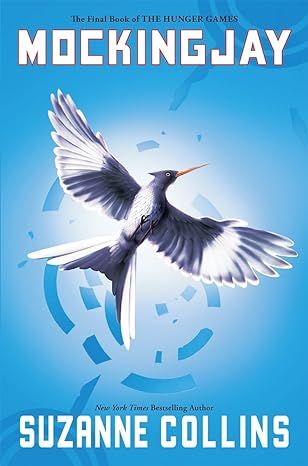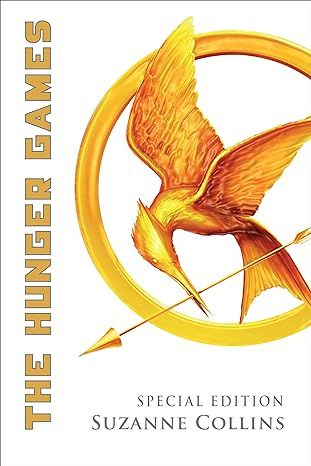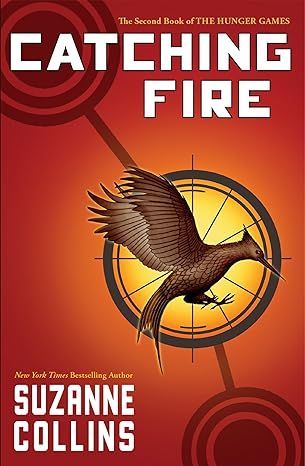Mockingjay (Hunger Games Trilogy, Book 3)
4.6
-
86,691 ratings
The third book in Suzanne Collins's phenomenal and worldwide bestselling Hunger Games trilogy.The final book in Suzanne Collins's worldwide bestselling Hunger Games trilogy is now available in paperback."My name is Katniss Everdeen. Why am I not dead? I should be dead."Katniss Everdeen, girl on fire, has survived, even though her home has been destroyed. There are rebels. There are new leaders. A revolution is unfolding.District 13 has come out of the shadows and is plotting to overthrow the Capitol. Though she's long been a part of the revolution, Katniss hasn't known it. Now it seems that everyone has had a hand in the carefully laid plans but her.The success of the rebellion hinges on Katniss's willingness to be a pawn, to accept responsibility for countless lives, and to change the course of the future of Panem. To do this, she must put aside her feelings of anger and distrust. She must become the rebels' Mockingjay - no matter what the cost.
Kindle
$14.99
Available instantly
Audiobook
$0.00
with membership trial
Hardcover
$19.89
Paperback
$10.53
Ships from
Amazon.com
Payment
Secure transaction
ISBN-10
0545663261
ISBN-13
978-0545663267
Print length
400 pages
Language
English
Publisher
Scholastic Press
Publication date
February 24, 2014
Dimensions
5.26 x 0.79 x 9.1 inches
Item weight
11.5 ounces
Frequently bought together
Popular Highlights in this book
“Fire is catching!” I am shouting now, determined that he will not miss a word. “And if we burn, you burn with us!”
Highlighted by 12,996 Kindle readers
He understands I don’t want anyone with me today. Not even him. Some walks you have to take alone.
Highlighted by 12,987 Kindle readers
And it takes too much energy to stay angry with someone who cries so much.
Highlighted by 8,223 Kindle readers
Product details
ASIN :
B003XF1XOQ
File size :
4539 KB
Text-to-speech :
Enabled
Screen reader :
Supported
Enhanced typesetting :
Enabled
X-Ray :
Enabled
Word wise :
Enabled
Editorial Reviews
Praise for Mockingjay:#1 USA Today Bestseller #1 New York Times Bestseller #1 Wall Street Journal Bestseller #1 Publishers Weekly BestsellerA New York Times Notable Children's Book of 2010A New York Times Book Review Editors' ChoiceA 2010 Booklist Editors' ChoiceA 2010 Kirkus Best Book of the YearA Publishers Weekly Best Book of 2010 "Fans will be happy to hear that Mockingjay is every bit as complex and imaginative as Hunger Games and Catching Fire."-Entertainment Weekly"Suspenseful... Collins' fans, grown-ups included, will race to the end."-USA Today "At its best the trilogy channels the political passion of 1984, the memorable violence of A Clockwork Orange, the imaginative ambience of The Chronicles of Narnia and the detailed inventiveness of Harry Potter."-New York Times Book Review "Unfolding in Collins' engaging, intelligent prose and assembled into chapters that end with didn't-see-that-coming cliffhangers, this finale is every bit the pressure cooker of its forebears. [Mockingjay] is nearly as shocking, and certainly every bit as original and thought provoking, as The Hunger Games. Wow."-Los Angeles Times*"This concluding volume in Collins's Hunger Games trilogy accomplishes a rare feat, the last installment being the best yet, a beautifully orchestrated and intelligent novel that succeeds on every level."-Publishers Weekly, starred review
Sample
1
I stare down at my shoes, watching as a fine layer of ash settles on the worn leather. This is where the bed I shared with my sister, Prim, stood. Over there was the kitchen table. The bricks of the chimney, which collapsed in a charred heap, provide a point of reference for the rest of the house. How else could I orient myself in this sea of gray?
Almost nothing remains of District 12. A month ago, the Capitol’s firebombs obliterated the poor coal miners’ houses in the Seam, the shops in the town, even the Justice Building. The only area that escaped incineration was the Victor’s Village. I don’t know why exactly. Perhaps so anyone forced to come here on Capitol business would have somewhere decent to stay. The odd reporter. A committee assessing the condition of the coal mines. A squad of Peacekeepers checking for returning refugees.
But no one is returning except me. And that’s only for a brief visit. The authorities in District 13 were against my coming back. They viewed it as a costly and pointless venture, given that at least a dozen invisible hovercraft are circling overhead for my protection and there’s no intelligence to be gained. I had to see it, though. So much so that I made it a condition of my cooperating with any of their plans.
Finally, Plutarch Heavensbee, the Head Gamemaker who had organized the rebels in the Capitol, threw up his hands. “Let her go. Better to waste a day than another month. Maybe a little tour of Twelve is just what she needs to convince her we’re on the same side.”
The same side. A pain stabs my left temple and I press my hand against it. Right on the spot where Johanna Mason hit me with the coil of wire. The memories swirl as I try to sort out what is true and what is false. What series of events led me to be standing in the ruins of my city? This is hard because the effects of the concussion she gave me haven’t completely subsided and my thoughts still have a tendency to jumble together. Also, the drugs they use to control my pain and mood sometimes make me see things. I guess. I’m still not entirely convinced that I was hallucinating the night the floor of my hospital room transformed into a carpet of writhing snakes.
I use a technique one of the doctors suggested. I start with the simplest things I know to be true and work toward the more complicated. The list begins to roll in my head. . . .
My name is Katniss Everdeen. I am seventeen years old. My home is District 12. I was in the Hunger Games. I escaped. The Capitol hates me. Peeta was taken prisoner. He is thought to be dead. Most likely he is dead. It is probably best if he is dead. . . .
“Katniss. Should I come down?” My best friend Gale’s voice reaches me through the headset the rebels insisted I wear. He’s up in a hovercraft, watching me carefully, ready to swoop in if anything goes amiss. I realize I’m crouched down now, elbows on my thighs, my head braced between my hands. I must look on the verge of some kind of breakdown. This won’t do. Not when they’re finally weaning me off the medication.
I straighten up and wave his offer away. “No. I’m fine.” To reinforce this, I begin to move away from my old house and in toward the town. Gale asked to be dropped off in 12 with me, but he didn’t force the issue when I refused his company. He understands I don’t want anyone with me today. Not even him. Some walks you have to take alone.
The summer’s been scorching hot and dry as a bone. There’s been next to no rain to disturb the piles of ash left by the attack. They shift here and there, in reaction to my footsteps. No breeze to scatter them. I keep my eyes on what I remember as the road, because when I first landed in the Meadow, I wasn’t careful and I walked right into a rock. Only it wasn’t a rock — it was someone’s skull. It rolled over and over and landed faceup, and for a long time I couldn’t stop looking at the teeth, wondering whose they were, thinking of how mine would probably look the same way under similar circumstances.
I stick to the road out of habit, but it’s a bad choice, because it’s full of the remains of those who tried to flee. Some were incinerated entirely. But others, probably overcome with smoke, escaped the worst of the flames and now lie reeking in various states of decomposition, carrion for scavengers, blanketed by flies. I killed you, I think as I pass a pile. And you. And you.
Because I did. It was my arrow, aimed at the chink in the force field surrounding the arena, that brought on this firestorm of retribution. That sent the whole country of Panem into chaos.
In my head I hear President Snow’s words, spoken the morning I was to begin the Victory Tour. “Katniss Everdeen, the girl who was on fire, you have provided a spark that, left unattended, may grow to an inferno that destroys Panem.” It turns out he wasn’t exaggerating or simply trying to scare me. He was, perhaps, genuinely attempting to enlist my help. But I had already set something in motion that I had no ability to control.
Burning. Still burning, I think numbly. The fires at the coal mines belch black smoke in the distance. There’s no one left to care, though. More than ninety percent of the district’s population is dead. The remaining eight hundred or so are refugees in District 13 — which, as far as I’m concerned, is the same thing as being homeless forever.
I know I shouldn’t think that; I know I should be grateful for the way we have been welcomed. Sick, wounded, starving, and empty-handed. Still, I can never get around the fact that District 13 was instrumental in 12’s destruction. This doesn’t absolve me of blame — there’s plenty of blame to go around. But without them, I would not have been part of a larger plot to overthrow the Capitol or had the wherewithal to do it.
The citizens of District 12 had no organized resistance movement of their own. No say in any of this. They only had the misfortune to have me. Some survivors think it’s good luck, though, to be free of District 12 at last. To have escaped the endless hunger and oppression, the perilous mines, the lash of our final Head Peacekeeper, Romulus Thread. To have a new home at all is seen as a wonder since, up until a short time ago, we hadn’t even known that District 13 still existed.
The credit for the survivors’ escape has landed squarely on Gale’s shoulders, although he’s loath to accept it. As soon as the Quarter Quell was over — as soon as I had been lifted from the arena — the electricity in District 12 was cut, the televisions went black, and the Seam became so silent, people could hear one another’s heartbeats. No one did anything to protest or celebrate what had happened in the arena. Yet within fifteen minutes, the sky was filled with hoverplanes and the bombs were raining down.
Read more
About the authors
Suzanne Collins
Suzanne Collins has had a successful and prolific career writing for children's television. She has worked on the staffs of several Nickelodeon shows, including the Emmy-nominated hit Clarissa Explains It All and The Mystery Files of Shelby Woo. Collins made her mark in children's literature with the New York Times bestselling five-book series for middle-grade readers The Underland Chronicles, which has received numerous accolades in both the United States and abroad. In the award-winning The Hunger Games trilogy, Collins continues to explore the effects of war and violence on those coming of age. Collins lives with her family in Connecticut.
Read more
Reviews
Customer reviews
4.6 out of 5
86,691 global ratings
Anonymous
5
WOW
Reviewed in the United States on August 30, 2010
Verified Purchase
EDITED below to add my comments in response to another review as requested by comments here.
The most powerful book in the series, Collins dives straight in to the realities of rebellion and war. At times hard to read, Mockingjay unflinchingly portrays war as it is... characters fighting over how far is to far in war, loss of innocence and innocent lives, knowing which side you are fighting for, along with the role media propaganda plays. Collins set out to tell kids in a way they can understand, the realities of war behind the images we see on TV. She succeeded... and even more so she succeeded without a particular left or right wing slant to the book, which is rare for these types of works. It is dark for YA, but it is also real and in that reality is it's value as a read for teens, who in 5 or less years could be on frontlines themselves.
What makes this book so powerful is the characters that Collins creates. Over the course of the 3 books you grow to know and love them, so seeing bad things happen to them, or them make bad decisions or grow apart hurts. But this speaks to the mastery of the work. If it wasn't so good, you wouldn't care so much. In a story about war the relationships will be tested, people will be lost, and yes, people will be broken. It could not have been any different and still be the story about the realities of war that Collins wanted to tell.
Highly recommend this entire series.
***************** Below my comments in response to Suzanne G's great review (link below): ***************** http://www.amazon.com/review/R1R6D1DAM9L0ZF/ref=cm_cd_pg_pg2?ie=UTF8&asin=0439023513&cdForum=Fx229UU4T33F95N&cdPage=2&cdThread=Tx2F3UH15I2LUG3&store=books#wasThisHelpful
I think your review is one of the most coherent and thoughtful of the negative reviews, but I still can't bring myself to agree entirely with it.
One of the more minor reasons is your use of the phrase "anti-war." This book is anything but anti-war. It is clearly laid out in the two preceding books all the reasons there must be a war, that war is the only option. Life in Panem is greatly improved after the war. A true anti-war piece of literature would have found other options besides war, or would have made post war life bleaker as a result of war. I think to reduce the message to "anti-war" or "war is awful" cheapens it.
Instead this book examines the realities of war, not just that war is awful but things such as the moral relativism that occurs in times of war. Gale's idea for the nut is a great example of this. For me this is where Gale crossed the line, but it could also be equally well argued that the Nut had to be either captured or destroyed for the rebels to ever win the war and since capture was impossible, Gale's plan was the only way to prevent further loss of lives and protect against the Capitol's rule. You can see this as well in the argument of the double bomb when Katniss is questioning Beetee and Gale about "playing from the Capitol's handbook" (at what point do we become the evil we fight against), but you also see her rationalizing it post-argument and wondering why she is so against it if it can defeat the Capitol. You made a comment about there being too much talk of strategy but I think in the strategy discussions is where you saw so much revealing info about who Katniss was and why, why Coin wasn't the solution, and why Katniss and Gale couldn't be together.
The dynamic between Gale and Katniss is so interesting in this book because they have such different perspectives upon entering the war. One of the reasons Katniss is so impotent for part of this book (drugged, hiding, crying) is because she is terrified to make any decision at all. This is well in line with what I would expect of any character who had every decision she made in HG and CF backfire to unintended consequences that only hurt those around her. This puts her in stark contrast to her longtime friend, Gale who is not afraid of making tough decisions but has never had to live with the results of them (until the end of MJ).
Gale has had to fight hard for the survival of his family, he has been forced to work in the mines he hates, been beaten and whipped. He has had to watch as the girl he loved fell for another because of the Capitol's games. Yet he has never been given the opportunity to know any Capitol people closely or to truly fight back and likewise has never had to feel the ramifications (particularly as they affect others) of his actions against them.
Katniss, on the other hand, has had the opportunity to know what it is like after you kill. She understands the ramifications of her actions. She knows that your actions don't always bring about the intended consequences. She has had the chance to know, and come to care for people in the Capitol, thus humanizing her enemy. You said something about Katniss being in no position to judge Gale, but I never thought she was judging him. She understood his decisions even when she didn't agree with them (and found herself wondering why she didn't agree). I think she would have made the same decisions as Gale had she not had the experiences she had, that led her to understand things Gale could not (such as how it felt having to live with those tough decisions). But she did have those experiences, and having had them she couldn't ignore them.
You said in one of your comments that you expected to see the bond between Gale and Katniss, and I think that bond was there in the way they felt comfortable challenging one another (something they had always done and that Katniss didn't do with those who didn't have her trust) and in Gale's knowledge of how Katniss worked. But here is a relationship that was built from day 1 on survival of their families, where they always differed in their extremeness against the Capitol (Gale always being the more vocal, more extreme). And now they are placed in an environment where food and daily survival are a given for their families (who are not actively engaged in the rebellion, and are receiving food and care regardless of if Gale and Katniss provide it), and where the battle against the Capitol is their primary concern. So their reasons for being together are less, and the things that separate them are more noticeable, all their tender moments together are based on past memories, not current feelings. In battle they are partners, because that's what they've always been, partners protecting each others backs. But when Katniss needs someone she seeks out Finnick or Haymitch, because they (having experienced what she has) will get it. Here again is where I think Gale and Katniss were always a tragic love story. Because, if not for Katniss' time in the arena, they may have grown to love each other equally over the years in district 12, but they still couldn't have been together because without the time in the games and the rebellion, Katniss (firm in her decision to never marry or have children) would have never allowed herself to succumb to the love and actually be with Gale.
Another complaint of yours, I think, was the treatment of Peeta and that Katniss barely fought for him. One, I think the fact that Peeta was hijacked (while making the book harder to read because it contained less of the tender moments from the previous 2) was what made Katniss truly come to appreciate Peeta. It gave her the opportunity to want the Peeta she had so often taken for granted and we see this in Katniss' feelings as they travel on their mission throughout the Capitol. Two, As far as why she didn't fight harder to get him back... well Katniss wasn't the most emotionally self-aware person. In HG on the train back to 12 she breaks Peeta's heart. And in the beginning of CF we find her wanting to be close with him again but not doing a damn thing about it, although everything in Peeta's nature says he would have forgiven her. So basically she spends 6 months letting Peeta mope, wanting him and doing nothing until Peeta makes the move to rebuild their relationship. Throughout CF we see her repeatedly pulling from him, because she doesn't think she deserves to have him since she will never fully commit to him (with the exception of the beach scene when she lets herself go but only to try and persuade him to save his life, and only temporarily giving in to her emotions). So no, I don't really find it out of character for her to not fight for him in MJ. I think it is completely her character. She thinks because she has decided on a life without a partner she has no right to fight for him. When hijacked Peeta confronts her about who she really is (you're a piece of work, aren't you"), she agrees with his assessment. So as much as she misses and wants the old Peeta who loved her and didn't see her cold, manipulative side, she can't find it within herself to particularly disagree with everything he sees in her now or to fight against that.
This too is an interesting aspect of the story for me. Because yes pre-hijack Peeta loved her in a very self-sacrificing way. But what did he truly know of the real Katniss? He had loved her since the first time he saw her, without ever having an actual conversation with her, and by the time he got to know her, he was blinded to her faults by his love for her. Katniss only knew Peeta in terms of his loving her. She recognized his steadiness, and the hope and tenderness he brought to things, but it was always a given, she never sought to be good enough to earn it. Post-hijacking Peeta saw everything about Katniss her good, and her bad. Katniss couldn't take Peeta for granted anymore. So when they "grew together" IMO they grew to a much deeper love than they could have otherwise experienced.
As far as Katniss's decision Peeta or Gale being made in the last 4 pages... to me it was clear from HG on that Peeta was always the choice... She felt things when kissing him she never felt with Gale, any moment of inhibition (sleep medicine, or semi-consiousness, etc) she found herself wanting Peeta, even after she so-called "chose" Gale in CF she was trying to talk herself out of wanting Peeta. So maybe that wasn't played out in the text officially until the last pages, but it is weaved throughout the books. I think from the moment you read the line referencing the meadow and "a place where Peeta's child would be safe" it is clear that the book will end with Peeta's child in a meadow. So even if it passed quickly in MJ it's was foreshadowed long before. I've read a lot calling it a "default ending" because Peeta was the one who came back. And true I don't think she would have ever chased him down. It wasn't her nature to chase a man, or to feel like she deserved a man like Peeta after all she had done.
But after a time of healing ("slowly I came back to life"), and in particular healing alongside Peeta she is ready. I don't think anywhere is it evident that she is dead inside. For me, when she declares she loves Peeta that is her victory, her declaration that the war has ended. Because she never would allow herself to admit to love or have a partner under the Capitol's rule. It meant she had healed enough to allow herself to love and be loved and to have forgiven herself enough to have been deserving of love. She waited 15 more years to have kids because experience taught her that the incoming power may not be better than the old power. And to me I imagine those 15 years as the time it took to rebuild, and fully demolish the arenas and build the memorials (look at how we are 10 years past 9-11 with the memorial still under construction, rebuilding still happening, and the after effects still being fought, I think 15 years is realistic). Dead inside, means no emotions good or bad. Instead, Katniss very realistically has good days and bad days. She says "when the bad days come" (meaning that there are good days in between). She talks about the terror of being pregnant with her daughter (which is very real for someone having lost so many people she cared about), but she also talks about the joy of holding her daughter in her arms.
Anyways, those are just my thoughts. I enjoyed your review and your comments a lot because it made me really examine why I felt the way I did about the book.
Read more
28 people found this helpful
A. R. Bovey
5
Unexpected Direction, but Perfection (Potential spoilers, but pretty vague)
Reviewed in the United States on August 24, 2010
Verified Purchase
This was a brilliant conclusion to the trilogy. I can only compare it to "Ender's Game" - and that is extremely high praise, indeed.
When I first closed the book last night, I felt shattered, empty, and drained.
And that was the point, I think. I'm glad I waited to review the book because I'm not sure what my review would have been.
For the first two books, I think most of us readers have all been laboring under the assumption that Katniss Everdeen would eventually choose one of the two terrific men in her life: Gale, her childhood companion or Peeta, the one who accompanied her to the Hunger Games twice. She'd pick one of them and live happily ever after with him, surrounded by friends and family. Somehow, along the way, Katniss would get rid of the awful President Snow and stop the evil Hunger Games. How one teenage girl would do all that, we weren't too sure, but we all had faith and hope that she would.
"Mockingjay" relentlessly strips aside those feelings of faith and hope - much as District 13 must have done to Katniss. Katniss realizes that she is just as much a pawn for District 13 as she ever was for the Colony and that evil can exist in places outside of the Colony.
And that's when the reader realizes that this will be a very different journey. And that maybe the first two books were a setup for a very different ride. That, at its heart, this wasn't a story about Katniss making her romantic decisions set against a backdrop of war.
This is a story of war. And what it means to be a volunteer and yet still be a pawn. We have an entirely volunteer military now that is spread entirely too thin for the tasks we ask of it. The burden we place upon it is great. And at the end of the day, when the personal war is over for each of them, each is left alone to pick up the pieces as best he/she can.
For some, like Peeta, it means hanging onto the back of a chair until the voices in his head stop and he's safe to be around again. Each copes in the best way he can. We ask - no, demand - incredible things of our men and women in arms, and then relegate them to the sidelines afterwards because we don't want to be reminded of the things they did in battle. What do you do with people who are trained to kill when they come back home? And what if there's no real home to come back to - if, heaven forbid, the war is fought in your own home? We need our soldiers when we need them, but they make us uncomfortable when the fighting stops.
All of that is bigger than a love story - than Peeta or Gale. And yet, Katniss' war does come to an end. And she does have to pick up the pieces of her life and figure out where to go at the end. So she does make a choice. But compared to the tragedy of everything that comes before it, it doesn't seem "enough". And I think that's the point. That once you've been to hell and lost so much, your life will never be the same. Katniss will never be the same. For a large part of this book, we see Katniss acting in a way that we can only see as being combat-stress or PTSD-related - running and hiding in closets. This isn't our Katniss, this isn't our warrior girl.
But this is what makes it so much more realistic, I think. Some may see this as a failing in plot - that Katniss is suddenly acting out of character. But as someone who has been around very strong soldiers returning home from deployments, this story, more than the other two, made Katniss come alive for me in a much more believable way.
I realize many out there will hate the epilogue and find it trite. At first, I did too. But in retrospect, it really was perfect. Katniss gave her life already - back when she volunteered for Prim in "The Hunger Games". It's just that she actually physically kept living.
The HBO miniseries, "Band of Brothers", has a quote that sums this up perfectly. When Captain Spiers says, "The only hope you have is to accept the fact that you're already dead. The sooner you accept that, the sooner you'll be able to function as a soldier is supposed to function: without mercy, without compassion, without remorse. All war depends upon it."
But how do you go from that, to living again in society? You really don't. So I'm not sure Katniss ever really did - live again. She just ... kept going. And there's not really much to celebrate in that. Seeing someone keep going, despite being asked - no, demanded - to do unconscionably horrifying things, and then being relegated to the fringes of society, and then to keep going - to pick up the pieces and keep on going, there is something fine and admirable and infinitely sad and pure and noble about that. But the fact is, it should never happen in the first place.
And that was the point, I think.
Read more
3 people found this helpful
surfergirl
5
Mockingjay - Brilliant conclusion to the Hunger Games series
Reviewed in the United States on September 26, 2010
Verified Purchase
*Note: Review may contain spoilers
So here it is, as promised, the final installment in the phenomenal Hunger Games series by Suzanne Collins, my review of Mockingjay. After my positive reviews of The Hunger Games and Catching Fire, I had some high expectations for the final book. I was not disappointed. Mockingjay was everything I wanted and more, all in all, a great conclusion to an exciting and can't-put-down series. But be forewarned, it's nothing like the previous two...it's dark and violent and brutally honest. You may love this book or you may hate it, but there's no denying that it will take you on a sublime roller-coaster of a journey.
As I mentioned in my review of Catching Fire which offered a preview of what the world would be like in Mockingjay, this unconditionally is a book of war. The world is bleak and filled with death. It is in fact a real-life version of the Hunger Games, only the world is the arena and there are no rules nor "tricks" to defeat the Gamemasters. The single ray of light and hope is Katniss Everdeen, the symbol of the revolution and its Mockingjay. But she is still under the thumb of the covert underground District 13, which of course has its own agenda...of power, control, and authority. The driving objective of the book, and our heroine, is to kill President Snow and overthrow the Capitol. In the end, Katniss does make it to the Capitol with the help of her combat team, and she does bring down President Snow, but not before losing almost everything that she holds dear. In Mockingjay, loss is simply a casualty of war where the luxury of mourning no longer exists. It is brutal, immediate, and final.
If you're looking for a romantic conclusion or a romanticized version of Katniss being an all-conquering heroine who takes up the mantle of power as the leader of the revolution, look elsewhere. If anything, Mockingjay shows that she is human, and in the end, just a teenage girl struggling to fulfill a role she never even wanted in the first place. So what if she runs and hides in closets? I don't see that as weak, I see that as human. She is flawed and frail, as are we all. I think that that was a very realistic portrayal of being under that kind of pressure and suffering from a very real post traumatic stress disorder. It made Katniss more of a hero to me than anything else because it was so believable. It was raw and it was real.
The whole new dynamic between the tortured Peeta and Katniss was also very real. Teens have enough problems dealing with the opposite sex even without trackerjack venom playing mind-tricks between them. In my opinion, I thought that dynamic gave a lot more substance to their relationship especially with respect to the epilogue, because they actually worked to make their relationship happen. He wasn't just Peeta from the other two books doing all he could to sacrifice everything for Katniss. By the force of the Capitol's torture, he hated her, which meant that they had to find each other through all of that hate and doubt and fear, for their relationship to make it. And somehow, they managed to do just that which to me is incredibly hopeful.
I think Suzanne Collins is a brilliant writer, and what she did with Mockingjay was perfect. Although the story continues from the first two books, this book is completely different. It is gritty and raw in a way that the other two weren't. There's no fluff, no sugar-coating of personality nor of emotion. It is a world of pain, anger, and self-doubt...a very dark place. Some people may not like it or may feel that Collins deviated from the other two books. I disagree. I think what she did with Mockingjay was phenomenal. Gale became what he always had been even from book 1, The Hunger Games - he became a hunter, a soldier. Even though he and Katniss had a relationship, I always thought there was a hardness about Gale, perhaps born of the difficulty of his life. In a way, I think one can draw a parallel between Gale and Katniss, because although everyone (including the author) says that she is cold and all about her own survival, I actually think that that's false. If she was, she wouldn't have so much doubt and run away to hide in closets - this emotional fragility gives her a softness that is the antithesis of Gale. He is the consummate survivor. I wasn't surprised when the war became his driving objective, and he and Katniss grew apart. I don't think that Gale was vilified at all in this book, I think he just became what he was meant to become all along. A fighter and a leader. He, probably, was the least broken character in this book, which naturally made him one of the strongest.
On the flip side, I do have to say that there seemed to be a lot more in this book related to the war and the revolution as opposed to the characters or their emotional relationship with each other. Considering how central Prim has been to the book and to its heroine, I was surprised that her death felt so flat to me. It was almost too quick - there was not enough homage paid to her death. Same with Finnick, another central character and friend to Katniss, who just died. Their deaths felt hollow and empty. A part of me understands that Collins is on a new direction with this book-namely the emotionless callous nature of war-so maybe she was trying to convey more of a jarring casualty of war death as opposed to an unexpected (and more sacrificial emotional death like Rue or Mags in the previous books).
This takes me to the whole debate between Katniss' last objective-to kill President Snow-when instead, she kills Coin. I honestly believe that this was Katniss standing up for what she felt was the right thing to do. Instead of being driven by hate to kill Snow, she knew that Coin was only in line to be the next dictator of Panem. What she did made it possible for Paylor (who seemed to be a good leader earlier in the book) to be voted in as President. This final act is certainly not the act of a pawn. Yes, Katniss is a broken fragile heroine (which apparently has upset many people who desperately wanted her to rise to the occasion and be a Hollywood hero) but she still manages to do the right thing for Panem. Doesn't that make her a true hero? There's a lot to be said for that, and I give her total credit.
At the end of the day, these characters have survived a war. They're not going to be all warm and fuzzy and blindingly happy. They are going to be broken and messed up, just trying to find a way forward day by day. Talk to any war veteran and you will see that what Collins has portrayed in this novel is not only a realistic expectation of the circumstances, but it is also a brutally honest and painful one. Other reviewers have said that if you want a fairy-tale, this book isn't for you. But the truth is, the fairy-tale is in there. It's just not where you would expect it. In my opinion, it is in the human capacity for strength, hope, and our innate ability to survive, putting one foot in front of the other and not giving up. Katniss and Peeta, as broken as they are, manage to do that despite all the ghosts that will more than likely forever haunt them. And that's a fairy-tale ending too, if only for the fact that there's beauty and hope in such strength.
I am in awe of this book, and of its author, Suzanne Collins. One of the biggest compliments is how torn readers are in their opinions, which in my view, just goes to credit the author because she is able to illicit such a passionate response from her readership. Brilliantly written and honestly executed, I would rate Mockingjay 5 out of 5 stars.
Check out my profile info for my website and other reviews.
Read more
8 people found this helpful
Robby R.
5
Bleak and Beautiful
Reviewed in the United States on July 11, 2011
Verified Purchase
If you liked The Hunger Games and Catching Fire, this book may not be for you.
This review will contain spoilers.
Okay, let me back up. I loved Mockingjay. But I think I loved it for reasons that a lot of other people didn't like it. Namely that it broke conventions and moved out of the comfort zone that the previous two books sit nicely in. It's hard to call 'Children murdering each other in an arena for the enjoyment of the masses' a comfort zone. But considering how disturbing the premise of the story is, the writing style and content of the first two books were clearly written in a safe way that were meant to appeal more to younger teens. This is not to say I (being in my early 20's) did not enjoy the first two books, but while reading them I got the same feeling I get when watching an action movie with lots of killing but little blood. There was that loss of immersion because the content did not match up nicely with the mood. In a kids movie, for instance, if a child breaks their arm let's say, it isn't necessary to explain the wound in detail, because the focus of a kids movie is not going to be about the injury, but rather the consequences of the injury. In a book like The Hunger Games or Catching Fire, though, the injury or kill should be in your face, to provide that contrast between the self-absorbed Capitol citizens and the horrendous nature of the Hunger Games themselves. To me, when that level of detail is added, it really brings the seriousness of the book's reality to the forefront, and when the writing is reserved, so is my emotional connection to it.
Mockingjay is very much a departure from the previous two books, and even though it has a couple of problems, they are forgivable to me because the rest of the book is so masterful. First off, Mockingjay is very dark, which is something I wanted from the first two books. It was hinted at, but the author never really brought me to those depths along with Katniss. Here though, there are points in which it is so dark I almost wished they'd give me a little light. And you really don't get any until the end. It could not have been as easy book to write, especially since it was so different from the previous two, and I imagine the author knew she was going to be alienating some fans of the first two, but I give her a lot of credit for that.
Secondly, because of the way the second book ends and this one begins, the whole love triangle thing that I thought was so unnecessary really isn't an issue throughout most of this book. Those two aspects are the two main reasons that this book really worked for me. It was almost like the author took my two biggest complaints from the first two and did away with both of them, allowing this trilogy to become what I wanted it to be from the beginning. Because of this, though, I know that there were probably a lot of unhappy readers when this book was finished. I can't call anyone else wrong, really, or myself right. This is just what I took away from Mockingjay, and for me, it was pretty fantastic. I can easily see how other readers might have been left feeling like 'No seriously, where's the real third book?'
Thirdly, the characterization in this book really stuck with me. Having seen a lot of movies and read a lot of books, you get to know cliches in stories pretty well. There are the general ones that everyone seems to know about, but over time you start to develop your own. There are broad cliches and ones suited to different genres and so on and so forth. But one of the other things that I loved about Mockingjay was that even though there were some overt cliches (and let's be honest, few things are original anymore and it is hard to avoid cliches), there were also some very surprising instances towards the end and I was pleasantly surprised by them. Most importantly, I have read quite a few reviews that talk about how Katniss never really came into her own. She never started to make decisions on her own. In The Hunger Games, as the books opens you are told she is essentially very emotionally damaged, by the physical absence of her father, and then the emotional absence of her mother. Katniss becomes the sole provider for the family. She is a very flawed person, and as the trilogy goes on, instead of overcoming obstacles, she seems, more often than not, to get run over by them. At the end of Mockingjay I began to hope (as did she) that she would just die, because she was so tortured and damaged that it would have been a relief to find a release from all the suffering. But there was nothing. However, although I agree that Katniss never became the consummate hero, I did think that there was a climax of sorts, with her internal struggle to assert control over her life. I am referring to the execution at the end. Katniss finally makes a decision on her own, knowing that the consequence will be death. She truly believes that her action will end her own life, and she does it anyways. I think the only problem with the scene is that her emotional feeling is not something that is explored by the author. Even though there is really only one reason why she does what she does, I felt that it could have been explored even a little bit. And even afterwards no one asks why she did it, as if they all know why. But if that's the case, then why didn't they do something about it? That's my only real gripe about the story.
I have also heard a lot of complaints about the ending. How it was much too fast, and not enough time was given to explaining what became of all the characters. And especially that they were unhappy about the way in which Katniss and Peeta ended up together. But I have to say, the Katniss-Gale-Peeta triangle was annoying from the get for me. It was an unwelcome distraction at the end of book one and all throughout book two. I liked that things did not end happily-ever-after. And I know those who complain about the ending weren't necessarily looking for some fairy-tale ending, I guess for me, I just really connected with the idea that life can leave you damaged, and you just can't recover from some things. You just do you best to get on with your life the best you can. And in the case of Katniss and Peeta, it made sense to me that they would end up together. They both experienced horror in multiple forms, they were both left very broken, so to me it was logical that they would end up together. I liked that things were left a bit unresolved, like they have to deal with their past on a daily basis, but that regardless of it, they have made the best of their lives that they could. If they had made some progress at the end, it would really have felt unrealistic. I liked that they really only returned to "normal" from being completely ravaged, instead of turning into emotional stones and brushing everything off. Their lives had holes, their bodies were burnt and tortured, but they emerged from the other side and continued surviving.
All in all, I would recommend reading the first two books just to get to this one. And nothing against the first two. They are both very good for what they are.
Read more
4 people found this helpful

L. Reeves
4
Mockingjay - 4 Stars
Reviewed in the United States on November 1, 2010
Verified Purchase
Warning! This review is written differently then all my other reviews. It does contain spoilers throughout, but you will get a warning once spoilers will begin.
The third and final book in the Hunger Games trilogy - Mockingjay has been one of the most anticipated books of fans of this much loved series. The first two books - The Hunger Games and Catching Fire - told a story rich in characters we all fell in love with and rooted for from beginning to end. With the release of Mockingjay readers were more then excited to find out the conclusion to this epic tale.
Giving Mockingjay the 4 stars that I did was in fact a hard choice to make. Writing this review is tough. I thought giving myself a few days or longer might clear away the questions I had to make writing this easier, which needless to say didn't work out as planned. I usually don't write a review with spoilers, nor do I write reviews where I talk things out at such length, but it needed to be done and this time there's just no way around it. So, please know that from this point on I will be addressing key points that will give things away - so be warned there will be SOME spoilers laced throughout!
Spoiler Alert
First, I have to say that I read half of this book with my breath held and the other half with a kind of, the only way I can explain it was that I was lost. The characters felt so different from where we left them in Catching Fire that at times it was hard to recognize them from the previous two books.
Katniss didn't seem like her normal fighting self. And I often wondered if that was because she questioned Coin and if she even wondered if things would be different with Coin as president. In the beginning of the book when they are trying to talk Katniss into being the Mockingjay there was a conversation with Coin that made me believe she felt she not only didn't have much of a choice in the matter but that she questioned just what Coin's true motives are behind everything. Is this why Katniss wasn't her normal fighting self? Was she just tired of running a race in a never ending up hill battle where she then believed no matter what she did the way of the world would never change? Or did she believe there was nothing she, just one teenage girl could really do to make positive changes in the world of Panem? Or was it the fact that she was pretty much injured throughout the whole book?
The lack of Peeta was also hard and what little interaction these two had I enjoyed more so then I did with her and Gale. I found Gale to be more then lost within Mockingjay, and found how easily he went from the hunter, gather and provider to uncaring and cold soldier a bit too easily. I mean everything with the mountain and his answer to how to take it down was more then callous and shocking to say the least. However the flip side is, Panem is a rough place to live and was Gale finally pushed over the edge too? Still, either way you look at this, it just didn't feel like "Gale" to me. Sad but true.
The ending was shocking. I felt it was rushed by many pages and left more holes in it then Swiss cheese. I mean, Gale is a HUGE character and to leave his story so open ended was wrong and extremely harsh. There was no closure with Gale - he's there one page and gone the next. I felt that Katniss's mother was selfish on so many levels. I understand all that her mother has gone through from before the beginning of book one, however Katniss has suffered through SO much for her whole family and all the people within Panem and her mother can't take a trip back to their home to make sure if her now only daughter is alright? That just didn't sit well with me and actually made me frustrated. I mean common! Look at all Katniss did and all she survived for the love of her family! And yes, I know Peeta and Haymitch had more of a hand in keeping Katniss alive then I'm giving credit here, however I'm really talking about how her relationship with her mother was within those last few pages of this book.
These were the main aspects of the book that I didn't agree with or understand. However, I did give Mockingjay 4 stars and now that I worked through all the negativity and got that out of the way, I believe that in all reviews, the ending should focus on the good and that's just what I plan to do here.
Peeta being tortured was a given, this wasn't a good thing, but... let me explain - anyone who reads Mockingjay will know its coming. However the degree to which this is done is not only epic but fit with the one character that I felt never changed - and that was Snow.
Everything that was shocking to me in this whole series is what I found as part of the best of the best. Peeta being tortured and just how he was tortured was not only a key part in his story as mentioned above, it was so true to Snow that anything less then this just would have been far off course for this ruthless character. The struggles in Peeta because of just how he was tortured, and then within his relationship with Katniss - it opened up and showed a different side to the two. I might not have liked what I saw, but if you think back to their relationship throughout the whole trilogy this was just another uphill battle they are forced to climb to figure out what their relationship meant to each other.
The story did give me many conclusions and endings to main and subplots. Where there might have been some holes, however there were answers and endings - both good and bad. The good surpassed the bad. The wedding between Finnick and Annie gave hope to everyone that was much needed throughout all of Panem. The little bits of strength that Katniss gains from Finnick were nuggets of gold within the pages of Mockingjay. Finnick, while suffering alone was able to rise above everything to be there for Katniss when she needed to be pulled up and out of the haze I often found her in.
Collins writing was there shining through again in Mockingjay, and while I didn't agree with many parts of this conclusion, sometimes a clear happy ending just isn't in the cards and that alone is sometimes need and often is refreshing in books. In each of the three titles there had to be bad to get through to the good and it's the same with Mockingjay.
I recently read something about how people are upset with the Epilogue and I can see where some would feel it was forced and some might find it a cop out. Yet I've read it a couple of times and I go back and forth on this one. Today I see how wonderful it is. For me, it shows that all Katniss struggled for wasn't lost. That in the end she won. Peeta won and that in the end they both found just want they needed in the world and each other. That nothing is perfect and everything isn't easy and sometimes you have to struggle to get to the good in life.
All in all, Collins has written another book that many will be thinking and talking about for a long time to come. With the end of any much beloved trilogy or series there's always a chance people will be upset because of how things ended and without a doubt there might be people not pleased by various things in this book. There might be things I didn't agree with, nor understand; however, in the end, I do have to say that the good outweighed the bad. I'll be suggesting these books for a long time to come to other fellow readers and I'll look forward to rereading each of these books numerous times. I'm more then looking forward to seeing just what Collins writes next. Enjoy.
For more info and reviews please visit my Book Review Blog here - [...]
Read more
3 people found this helpful
Top Suzanne Collins titles
Best Sellers

The Great Alone: A Novel
4.6
-
152,447
$5.49

The Four Winds
4.6
-
156,242
$9.99

Winter Garden
4.6
-
72,838
$7.37

The Nightingale: A Novel
4.7
-
309,637
$8.61

Steve Jobs
4.7
-
24,596
$1.78

Iron Flame (The Empyrean, 2)
4.6
-
164,732
$14.99

A Court of Thorns and Roses Paperback Box Set (5 books) (A Court of Thorns and Roses, 9)
4.8
-
26,559
$37.99

Pretty Girls: A Novel
4.3
-
88,539
$3.67

The Bad Weather Friend
4.1
-
34,750
$12.78

Pucking Around: A Why Choose Hockey Romance (Jacksonville Rays Hockey)
4.3
-
41,599
$14.84

Start with Why: How Great Leaders Inspire Everyone to Take Action
4.6
-
37,152
$9.99

Tomorrow, and Tomorrow, and Tomorrow: A novel
4.4
-
95,875
$13.99

Weyward: A Novel
4.4
-
27,652
$11.99

Tom Lake: A Reese's Book Club Pick
4.3
-
37,302
$15.74

All the Sinners Bleed: A Novel
4.4
-
12,894
$13.55

The Mystery Guest: A Maid Novel (Molly the Maid)
4.3
-
9,844
$14.99

Bright Young Women: A Novel
4.2
-
8,485
$14.99

The Wager: A Tale of Shipwreck, Mutiny and Murder (Random House Large Print)
4.5
-
28,672
$14.99

Hello Beautiful (Oprah's Book Club): A Novel (Random House Large Print)
4.4
-
79,390
$14.99

Small Mercies: A Detective Mystery
4.5
-
16,923
$10.00

Holly
4.5
-
31,521
$14.99

The Covenant of Water (Oprah's Book Club)
4.6
-
69,712
$9.24

Wellness: A novel
4.1
-
3,708
$14.99

The Art Thief: A True Story of Love, Crime, and a Dangerous Obsession
4.3
-
4,805
$14.99
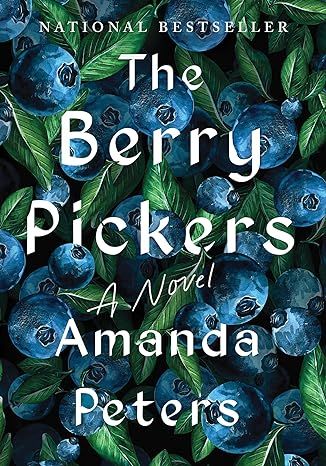
The Berry Pickers: A Novel
4.5
-
14,209
$14.99
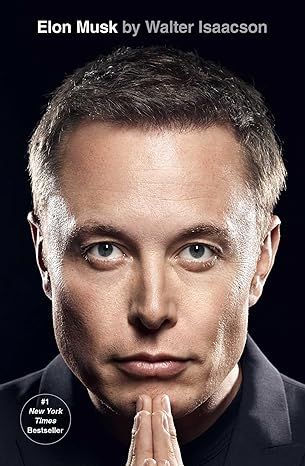
Elon Musk
4.7
-
15,272
$16.99
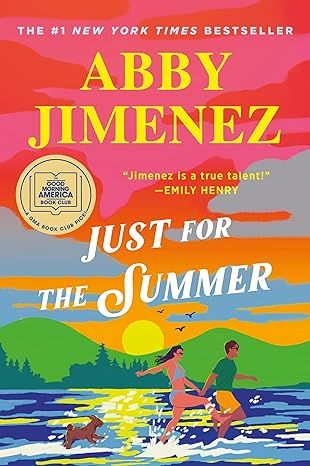
Just for the Summer
4.6
-
19,524
$11.99
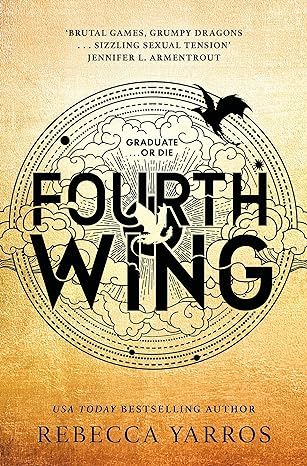
Fourth Wing (International Edition)
4.8
-
206,495
$7.95
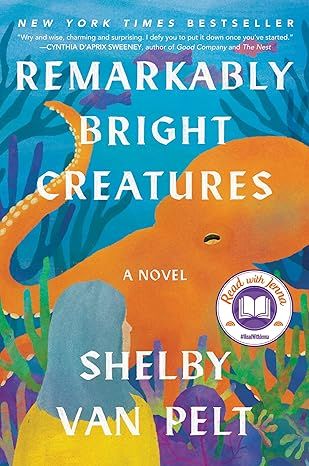
Remarkably Bright Creatures: A Read with Jenna Pick
4.6
-
65,556
$15.80
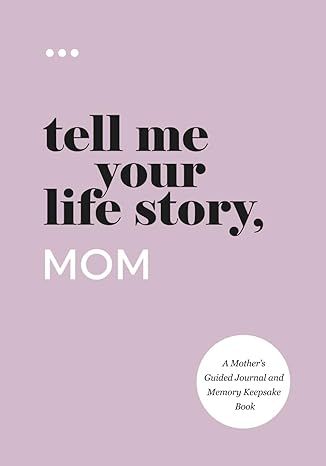
Tell Me Your Life Story, Mom: A Mother’s Guided Journal and Memory Keepsake Book (Tell Me Your Life Story® Series Books)
4.7
-
5,107
$11.24
